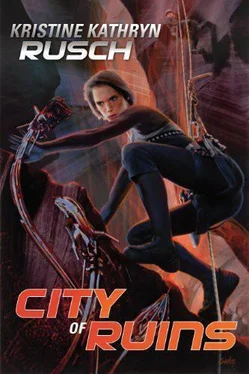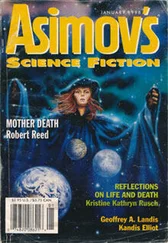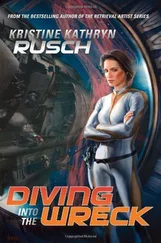The lights here are gray. That irritates me. The other lights come from the spectrum—blue to red—but gray doesn’t fit. Finally I grab an equipment box, climb it, and wipe at the lighted area with my glove.
Something flakes onto my suit, and that section of the light turns white.
The lights here are covered with flaked bits of wall. For the first time, I’m happy for the suit. I remember Bridge’s comment from that first day: Something that small and powerful might do some harm if it gets into the lungs.
We all stop and take samples of everything—the air, the ground, the walls, and the lights. We haven’t been able to remove the lights from the walls—the lights are truly grown in—but we scrape the surfaces. Just like we scrape the ceiling and the floor.
When we come out with our flaked treasure, we use hazardous-procedure techniques to remove our suits. We have no idea how dangerous that flaked stuff is—if it’s dangerous at all.
The flaking worries everyone but me. I’m finally happy to see something new and different. I was becoming afraid that we’d explore hundreds of miles of caves and find nothing except lights and black walls.
I know now that such a worry is silly. We’re going to find something. I know it as clearly as I know my name.
We’re going to find something, and we’re very, very close.
~ * ~
It takes two days.
We map that flaked corridor centimeter by centimeter. We examine each part of it.
Our scientists determine that the flakes are nothing more than particles that have come off the walls, just like I thought. Only they’re able to date those particles by comparing them to the samples taken from our very first day.
The particles are at least four thousand years older.
I say at least because Bridge says at least. He really can’t predict. When he presented the data, he reminded me that the older sections of the wall— those that formed years ago—showed no more aging than the newer sections. So he has no idea—the scientists have no idea—how long the walls stand before they start showing evidence of age.
He makes his guess based on the historical record. He knows that we have found areas that are at least three thousand years old with no sign of aging at all.
The corridor here is murky—we’ve disturbed so many particles that the air is gray—and a day ago, we started to get readings that reminded me (and Roderick and Mikk) of readings we got near the Room of Lost Souls.
My headache remains, but now I know it comes from stealth tech because I hear a low humming, as if voices are harmonizing softly. Three of the Six hear it as well.
Something is here, something strong. I almost wish it wasn’t so I can bring in a real dive team. It’s clear that the Six are out of their element. DeVries, Quinte, Seager, and Kersting are tired. Rea and Al-Nasir wonder why we have to pay so much attention to detail.
They think the minuscule is unimportant, and their impatience infects me.
I take Rea down the corridor two meters farther than we should go. I take him because that part of the corridor remains dark.
“Maybe,” he says as he turns on the lamps built into his suit, “the wall lights are completely covered in particulate.”
“Maybe,” I say, but I don’t think so. I have already trained my headlamp at the top of the wall, where the lights usually bulge out. I see no bulge. I see nothing to indicate lights at all.
I stand in the center of the corridor and wave my arms, thinking maybe the motion sensors will pick up something, but they do not. All I manage to do is swirl the particles even more. It’s as if we’re in the middle of a dust storm.
Then the light from my headlamp catches something directly in front of me. A movement. My heart starts to pound.
“Did you see that?” I ask Rea.
He turns, training his headlamp in the same direction as mine. The movement repeats and I realize it’s a reflection.
Something is blocking the corridor.
“Let’s check it out,” he says, and starts forward. I catch his arm.
Now more than ever procedure is important.
“We map,” I say, and I can hear his sigh echo through our suit comms as well as through the air. We map, we go slowly, we figure out what’s ahead.
It takes two more days before we understand that what’s ahead is not the end of the corridor, as some of the team speculated, but a door.
A door.
An old, old door without warnings, markings, or lights.
Just a latch that no one has turned in at least four thousand years.
~ * ~
I‘m going in with you,” Roderick says.
“Me, too,” Mikk says.
They stand outside the hovercraft, their suits already on. The guides watch us like we’re the science experiment. The Six stand in the corridor, holding their equipment like shields.
Roderick and Mikk have seen that. They know that the Six are frightened, and they know that frightened divers make mistakes.
They also know that I’m eager, and eager divers make mistakes as well. A different set of mistakes, but mistakes just the same.
“No,” I say. “You can’t go in. We’re getting readings that remind me of the Room.”
“We never really tied those readings to stealth tech,” Roderick says.
“And these readings are significantly different,” Mikk says. “The group has been studying them for more than a week.”
“They’re similar,” I say.
“They’re similar the way light and sound are similar. They’re both waves, but they’re not the same thing.” Mikk’s education is showing, and he doesn’t even realize it.
I shake my head. “That’s a specious analogy. These readings are similar in ways I don’t like. It’s as if this field is fresher than the one near the Room. Or more active.”
“Or stronger,” says DeVries. He’s come closer to us, apparently wanting to hear the argument. “Whatever’s down that corridor, it’s powerful.”
“And it might be behind that door. The source. Think of that,” Roderick says.
“I do,” I say. “Then I remember that through another door was a seemingly empty room where both my mother and my friend died. I don’t want to risk both of you.”
“What if this isn’t stealth tech?” Mikk asks. “Then we’re risking all of you.”
“It’s stealth tech,” I say. “I can hear it.”
They look at me. No one except the few of us who can hear stealth tech understands what I mean. Not all of the Six can hear it. I’m not sure what the difference is, but it’s an important one.
And I think it’s a good, nonscientific way to recognize stealth tech—at least for people like me.
Someone behind me drops an equipment box. We all jump. The sound echoes in the enclosed space.
“Risk is what we signed on for,” Rea says. He has gained a lot of confidence in the past few weeks. “We’re going in.”
“Maybe we should tether,” Mikk says to me. “So we can pull you all out if there’s a problem.”
I shake my head. “If there’s a problem, then the tether might decay before you realize we’re in trouble. I’m not sure how far the field extends. It might only be a few meters, but it might be more than that.”
Mikk frowns at me. He’s right. We need some kind of backup.
I say, “Here’s what I’ll do. I’ll station two divers at the first junction. Two more near the door, and then three of us will go inside—provided we can open it, of course. If we can, one will remain near the door, recording, while two of us start mapping.”
“I don’t like it,” Roderick says.
“I know,” I say because I can’t say what I’m thinking, which is, I don’t care what you like. This is what we’re going to do. “It’s our best option.”
Читать дальше











